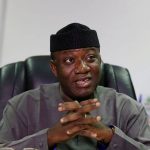The Church of the Brethren in Nigeria, otherwise addressed in Hausa as Ekklesiyya Yan’uwa a Nigeria (EYN), says it has lost over 8,370 members to Boko Haram attacks in the Northeast.
The EYN, which has its headquarters in Kwarhi, Adamawa State, but has branches mostly across the Northeast, also said at a world press conference in Yola Thursday that President Muhammdu Buhari did not paint the correct picture when he said in his Democracy Day speech on June 12 that residents had returned to all local government areas once taken over by Boko Haram.
The EYN President, Rev Joel Billi, who delivered the text of the press conference in Yola, stressed that the EYN is the single Christian denomination that has been worst hit by activities of Boko Haram.
According to him, in addition to more than 8,370 members and eight pastors of the EYN who died in attacks by Boko Haram, “over 700,000 members have been displaced, with only seven out of 60 District Church Councils not directly affected by the insurgency.”
The EYN president added that 300 of the church’s 586 branches were either burnt or damaged in some way by Boko Haram, and that “uncountable number of houses of our members were either burnt or looted.”
He said many members had been abducted, and that 217 of the abducted 276 Chibok school girls were members of the EYN.
Faulting President Buhari’s assertion that normalcy had returned to places once held by Boko Haram and displaced residents had returned, Rev Joel Billi said, “EYN had four District Church Councils (DCC) prior to insurgency in Gwoza Local Government Area of Borno State of which none is existing today.’
He added, “There are over 18,000 of our members who are still taking refuge in Minawao, Cameroon. There are also about 7,000 of EYN members in other camps in Cameroon.”
He added that although there are people now in Gwoza and Pulka, but all displaced communities behind the Gwoza Hills are still not inhabited.
The EYN President appealed to President Muhammdu Buhari to deploy at least a battalion of the military behind the Gwoza Hills so that residents currently in refugee camps in Cameroon and those in IDPs camps around Nigeria could have the courage to return to their ancestral homes in Gwoza and other insurgency affected communities in Adamawa, Borno and Yobe States





